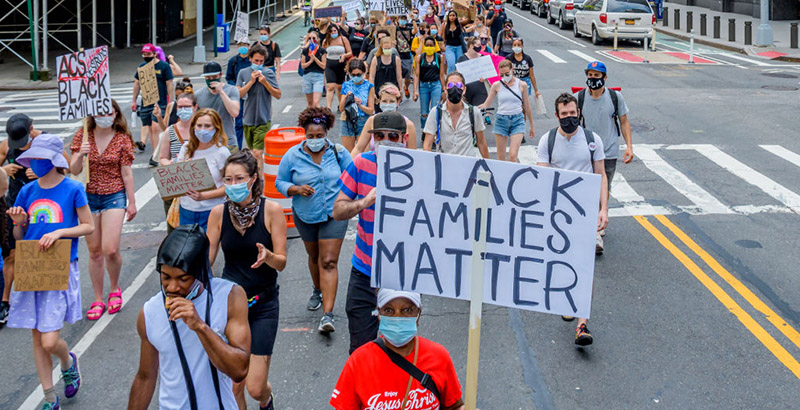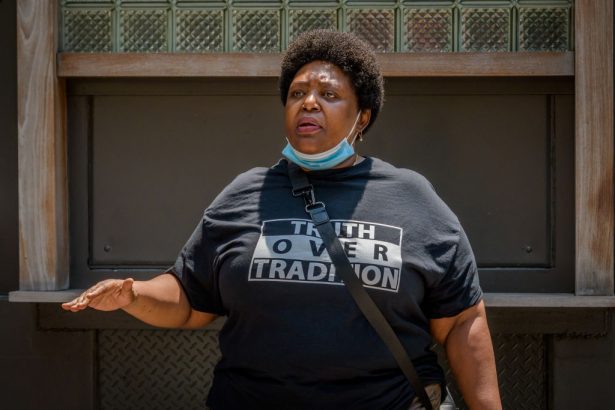New Law Center to Fight Illegal Family Separation by NYC Child Welfare Agencies

Get stories like these delivered straight to your inbox. Sign up for The 74 Newsletter
In New York City and across the U.S., David Shalleck-Klein believes child welfare agencies routinely violate the Constitution by carrying out unlawful searches and family separations — with disastrous consequences for the low-income Black and Hispanic families they disproportionately investigate.
Having worked for five years as an attorney at Bronx Defenders, he would repeatedly see the Administration for Children’s Services, NYC’s child welfare agency, “blatantly violating family’s rights,” he said.
They would intimidate families to gain entry into their homes, he said, conduct intrusive searches, including asking children to take off their clothes to look for bruises and, in the most dire cases, separate youth from their parents without judicial approval by acting under what’s known as emergency removal powers. Yet in hundreds of instances each year, according to city data, judges would then deem the agency’s use of those emergency powers unlawful.
The attorney last week launched what he says is the nation’s first civil rights organization dedicated to fighting back against such violations: the Family Justice Law Center.
There’s a long tradition of groups such as the American Civil Liberties Union or the NAACP Legal Defense Fund bringing lawsuits against alleged government wrongdoing, but “there’s no comparison to the child welfare system for when families’ rights are violated,” said Shalleck-Klein.
“This is the first organization in the country that is going to be dedicated to going on the offense and suing government agencies when they violate families’ rights,” he told The 74. “We’re filling a gaping hole in advocacy for parents.”
The Center will bring cases against ACS including alleged Fourth Amendment violations for illegal searches and seizures, he said. It will seek financial penalties to compensate families for their damages and will request injunctions against ACS practices it says are illegal.
“They’re not going to just get a slap on the wrist. They’re very literally going to have to pay for their mistakes,” said Shalleck-Klein.
“These types of lawsuits are hard,” he admits, but said he’s confident that “we’re going to be able to have not just success for individual clients, but also transformative systems change success.”
As many as 73,000 NYC children are the subject of ACS investigations each year, 87% of whom are Black or Hispanic. Although 23% of youth in the city are Black, they make up 56% of children removed from their families and placed in foster care.
In 2019, out of more than 1,750 emergency family separations, over a quarter were immediately rejected by a Family Court judge and still more were thrown out in the days and weeks to come — meaning hundreds of children were unnecessarily put through the trauma of family separation, which studies show is associated with elevated risks of mental health challenges, incarceration and even early death.
“When ACS removes a child from a parent without a court order, if they did not have legal justification for that [removal], that is a constitutional violation,” said Shalleck-Klein. “We know that it is happening routinely.”
“ACS follows federal, state and city laws, and respects the constitutional rights of parents and children,” an ACS spokesperson said in an email to The 74, adding that the agency “is committed to being responsive to the needs of children and families.” ACS is required by law to investigate all reports it receives, the spokesperson said, noting that the total number of children entering foster care since 2017 has dropped by more than a third.
Fewer than 2% of ACS investigations in 2021 resulted in child separation, the agency said.
“It is deeply concerning to us,” the spokesperson added, “that, year after year, there are dramatic racial and ethnic disparities in the reports ACS receives from the state.”
The agency is working to provide child care professionals with implicit bias trainings and education on ways to support families without calling the state’s child abuse hotline, it said.
Across the country, Black youth are more likely than not to experience a child welfare investigation, with 53% of all Black Americans undergoing the experience before they turn 18. Even if the investigations find no evidence of abuse or neglect, charges can remain on parents’ records for years, jeopardizing job prospects in fields like education and child care.
Meanwhile, many white families hardly feel the presence of child protective services at all. A former ACS caseworker spoke with Mother Jones in 2020, relaying that, once, when she was looking for an elusive parent, she saw a white woman nearby and asked if she knew the parent’s whereabouts. The neighbor had never even heard of the caseworker’s agency.
“I never met one single Black family that asked me, ‘What’s ACS?’” the caseworker reflected. “There’s one group of people walking around not knowing that ACS exists, and there’s another group of people walking around living in fear of ACS.”
In fall 2020, Harlem community advocate Joyce McMillan interviewed New York City residents in majority-Black, Hispanic and Asian-American neighborhoods about their experiences with the agency and turned their responses into posters that now hang throughout the city.
“They tore my family apart,” one parent said.
“I felt like the police had come to my house once ACS came because they investigated my household like the police,” said another.

Out of the 500 residents to whom McMillan spoke, all but two or three, she said, knew about the agency. Youth and parents alike were haunted by their experiences, she said.
“For children, ACS is like the boogeyman. They run and hide when ACS knocks on the door. They think they’re going to be taken away from their parents,” explained McMillan, who is executive director of JMacForFamilies. Her organization seeks to abolish what it calls the “family regulation system” and calls for the government to support rather than punish families living in poverty. She now sits on the Family Justice Law Center’s community advisory board.

The new legal organization, she told The 74, will be a game-changer for families, finally giving them the opportunity to fight back when they believe their rights are violated.
“Families will have resources to deal with the harm,” she said. “ACS, we call them the family police for a reason. … Until the cameras started rolling, people didn’t believe that Black people got shot in the back and weren’t actually carrying a gun. And it’s the same thing with ACS. So I hope that this work that’s being done will bring out the truth.”
Attorney David Bloomfield, who represented NYC as an assistant corporation counsel, said “on a case-by-case basis, I think there are winnable situations of improper separation,” but system injunctions against ACS might be a “heavier lift.”
Still, the Brooklyn College and CUNY Graduate Center law professor said “it can have a chilling effect on improper conduct if there’s able counsel for the families.”
The Family Justice Law Center has been selected for in-kind funding and guidance from the Urban Justice Center’s Social Justice Accelerator program. Legal scholars from Stanford, Harvard, New York University and other institutions sit on its academic advisory board.
ACS obtains court permission to enter homes in under 1% of all investigations. In most other searches, parents give the caseworker verbal permission to enter their space. But if a caseworker bangs on the door saying that they will return with the police if the family doesn’t let them in, and if the parents don’t know their legal rights, “Was that really a voluntary entry into the home?” asks Shalleck-Klein.
“[Child protective services] may seek the assistance of the police if CPS determine that immediate protective measures are necessary,” the agency said.
Similarly, 27% of emergency child removals get immediately struck down by a Family Court judge. While the emergency removal power is vital when youth are in imminent danger, said the attorney, its abuse can represent an unconstitutional seizure.
“ACS knows there’s no consequence for them doing something illegal,” he said. “If they violate families’ rights, what happens is that the child is returned home. But there’s nothing in the moment stopping them or giving them any pause from conducting an emergency removal when there’s not just cause.”
“We hope that the [Family Justice Law Center] will inject more accountability into the process,” he continued, “because they are now put on notice that they can’t act with impunity and their illegal actions will be challenged in court.”
Shalleck-Klein hopes the Center’s work will lead to fewer children in the foster care system and shorter durations for those who are, while not worsening, or even decreasing, the rates of child maltreatment. “In other words, keeping as many children home safely with their parents as we can,” he said.
The goal parallels the impacts of other changes in the Family Court system. When the legal team representing defendant parents includes social work staff and parent advocates, foster stays were significantly reduced with no change in child safety outcomes, a 2019 NYU study found. And similarly, pilot programs that boosted legal defense for families led to major savings for municipalities by avoiding costly foster care when poverty-induced issues might otherwise have been mistaken for parental neglect, a 2020 evaluation from Casey Family Programs revealed.
McMillan hopes the plan succeeds, not just for the children who might avoid unneeded family separation, but also for those who indeed are suffering from abuse at home.
If ACS spends less time mistaking poverty-related issues for abusive parenting, “then maybe they will focus on children who actually need help,” said the advocate.
Get stories like these delivered straight to your inbox. Sign up for The 74 Newsletter


